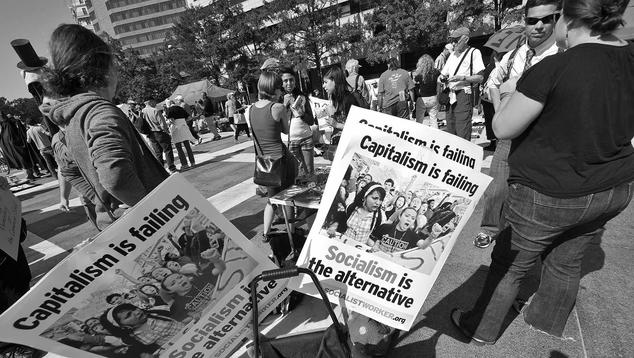The word "socialism" is likely to resonate throughout the 2020 election campaign, regardless of which candidate eventually gets the Democratic Party nomination.
Sen. Bernie Sanders is an avowed Democratic socialist -- and should he secure the nomination, "socialism" would be ever-present in President Donald Trump's messaging, as it has been already in the primary season. If Joe Biden gets the nomination, it's likely that Trump and the Republicans will continue to use the label in their efforts to position the Democrats as a far-left party. As Trump recently said about Biden: "Everyone knows [Biden's] not a communist … but he's definitely a radical-left socialist Democrat, and people know that."
Trump and other Republicans clearly think the term "socialism" is a distinct pejorative that can be used against their opponents to yield a net-positive benefit to Republican election chances. It was no accident that the official theme of this year's Conservative Political Action Conference (CPAC) -- at which Trump spoke -- was "America vs. socialism." The conference included sessions with titles like "Socialism: Wrecker of Nations and Destroyer of Societies," "Socialism and the Great Awokening" and "Prescription for Failure: The Ills of Socialized Medicine."
Down-ballot GOP candidates will also attempt to use the socialist tag against their opponents. Republican Sen. Tom Cotton of Arkansas recently released an ad in his Senate reelection campaign displaying images of U.S. servicemen as a voiceover proclaimed: "They fought and sacrificed to keep us free, but now socialism has taken over the Democratic Party."
Certainly, many Democratic politicians disagree that socialism is an inherent negative. When asked about criticisms of the term, Sanders' typical retort is that the country already has socialism -- socialism for the rich, including tax breaks and concessions given to wealthy individuals and corporations by the U.S. government. Rep. Alexandria Ocasio-Cortez, herself a Democratic socialist, says that "when millennials talk about concepts like Democratic socialism, we're not talking about these kinds of 'Red Scare' boogeyman. We're talking about countries and systems that already exist that have already been proven to be successful in the modern world. We're talking about single-payer healthcare that has already been successful in many different models, from Finland to Canada to the U.K."
Americans' Views of Socialism Are Net-Negative
Given these divergent positions on socialism among party thought leaders, a key question becomes:
What does the word "socialism" mean to the average American?
Thanks to the reintroduction of the term into the political discourse by Sanders (and other politicians like Ocasio-Cortez), we have quite a bit of recent public opinion research to help answer that question.
We can say definitively that the word "socialism" is viewed more negatively than positively by Americans, taken as a whole.
Gallup most recently found that 39% of Americans have a positive opinion of socialism, compared with 57% who have a negative opinion. Pew Research's most recent survey showed 55% with a negative opinion of socialism, and an NBC News/Wall Street Journal poll showed a 19% positive/53% negative split. A Monmouth poll found that 57% of Americans believe socialism is not compatible with American values.
These net-negative views of socialism seem to be quite stable. Gallup asked Americans to evaluate the term five times between 2010 and 2019; positive responses remained within a narrow range of 35% to 39% across the nine-year span.
As we would expect given this net-negative reaction to the term "socialism," a slight majority of Americans (51%) say they would not vote for an otherwise well-qualified person for president who is a socialist, while 47% say they would.
These attitudes have not changed over the past five years. While the 47% who would vote for a socialist is certainly not a low percentage on an absolute basis, it is notably the lowest "would vote for" of any of the 12 characteristics tested in our recent research -- well below the percentage of Americans who would vote for an atheist (60%) or a Muslim (66%) for president.
Along these same lines, a recent Suffolk University poll showed that 67% of Americans say they would not be satisfied with a presidential candidate who thinks the U.S. should move in a more socialist direction.
These results suggest that Republicans are in a somewhat better position than Democrats vis-a-vis any pending fight over socialism.
Democrats Much More Positive Than Republicans About Socialism
One of the defining characteristics of our age is political polarization. Attitudes toward socialism are no exception to this phenomenon. We (and other researchers) find a wide gulf in the views of Democrats and Republicans about socialism, with 65% of Democrats in Gallup's latest update saying they have a favorable view, contrasted sharply with 9% of Republicans and 41% of independents.
The data also show significant differences by generation. A recent Gallup analysis showed that 49% of millennials and Gen Zers have a positive view of socialism, contrasted with 39% of Gen Xers and a still lower 32% of baby boomers and traditionalists (those aged 55 and older).
No Agreement on What 'Socialism' Means
Part of the reason why Americans may be so divided in their attitudes toward socialism is the reality that the term can be understood and defined in different ways by different individuals and differing groups.
In September 2018, Gallup updated a question first asked of Americans in 1949: "What is your understanding of the term 'socialism'?"
The results demonstrated a wide variance in Americans' responses. As I noted in my review of the data: "These results make it clear that socialism is a broad concept that can -- and is -- understood in a variety of ways by Americans."
Some Americans adhere to what might be called a more traditional definition of socialism -- government ownership of the means of production (a definition that was dominant in 1949). But as many or more Americans today define the term in what I have called "softer, gentler" ways, stressing that socialism connotes equality, the provision of social services and benefits to the population, and getting along socially with other people.
Not surprisingly, Republicans are more likely than Democrats to see socialism as government control of the economy (and in other derogatory ways), while Democrats are more likely to say socialism means government provision of services.
Pew Research last fall asked Americans to explain the reasons for holding positive or negative views of socialism. Those who view socialism positively talked about the ways in which socialism would create a fairer, more generous economic system, and how socialism would build on and improve capitalism. Those who view socialism negatively talked about the impact of socialism on undermining Americans' work ethic and building an increased reliance on the government, along with mentions of the historical failure of socialism when adopted in other countries and how socialism does not complement the U.S. government system.
Bottom Line
Americans are by no means united in their views of socialism -- but on the whole, the public tilts more negative than positive toward the concept, and this situation has not changed materially over the past 10 years.
Both presidential campaigns will no doubt attempt to define and position socialism in the way that best fits their campaign strategies -- Republicans will excoriate socialism as a lethal threat to the nation, while Democrats will either attempt to move away from the label or explain how it actually benefits the country and its residents.
Republicans' continued efforts to position the Democratic presidential candidate (and the Democratic Party as a whole) as socialist could have several positive payoffs for the GOP. First, it has the potential to increase enthusiasm and turnout among the Republican rank-and-file. Second, it could create doubts among the third of Democrats who themselves are trepidatious about socialism. Third, it could help deter independents who might be on the fence about their vote from pulling the Democratic lever in the voting booth.
If Democrats are identified with socialism during the campaign, they could, in theory, benefit by using the situation to encourage high turnout among liberal voters who embrace the concept. Plus, the party could continue Sanders' efforts to redefine socialism, pointing out that the government already redistributes money to the rich. Additionally, of course, Democrats can argue that the government currently collects and then redistributes money for housing, health and other needs, and that public schools in this country are essentially a socialist enterprise in the sense that money is collected from all citizens and then used by government entities to provide schooling.
But all in all, available data on the public's reactions to the term "socialism," an analysis of the public's views of socialist-type programs and a recognition of the less-than-enthusiastic response of the public to the idea of more government control of daily functions suggest that Democrats have a challenge in front of them if socialism becomes the dominant theme of the 2020 election campaign.




